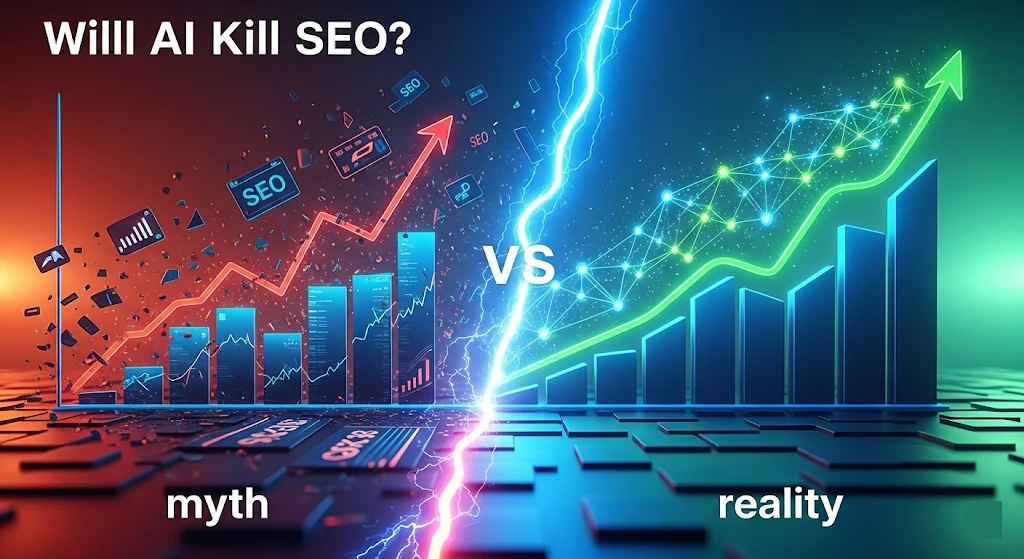
You know those sci-fi movies where robots suddenly take over the world? For many people in digital marketing, the rise of AI in search feels a lot like that. Over the past few years, the headlines have been dramatic: “SEO is dead!” or “AI has replaced everything we know about search.”
But let’s take a moment to breathe. The truth is far less terrifying and a lot more interesting. In 2025, the battle between AI and SEO is over; it’s a harmony. Rather than whether AI will kill SEO, the real question is how AI is changing the way we practice it. So today, let’s break down Will AI Kill SEO? Myths vs Reality in 2025, and uncover what’s really happening.
However, let’s first understand AI’s role in search, or more specifically, AEO.
What is Answer Engine Optimization (AEO)?
If you’ve been in marketing circles for a bit lately, you’ve probably heard the term Answer Engine Optimization (AEO) being thrown around. I get asked questions like:
- “Are AI Overviews going to kill traffic completely?”
- “Do I now need an LLMO (Large Language Model Optimization) consultant?”
The panic is real. But here’s the reality: AI didn’t kill SEO, it just raised the bar.
Think of AEO as SEO’s evolved cousin. Traditional SEO was about ranking your website on a results page. AEO, on the other hand, is about positioning your content as the answer itself. Instead of being “one of many links,” your content has the chance to show up as:
- A Featured Snippet or “People Also Ask” box.
- A spoken answer from a voice assistant.
- A synthesized AI summary in tools like Google’s AI Overviews or ChatGPT responses.
So the fundamentals, “strong technical SEO, useful content, and trust”, are still the foundation. They’ve just become non-negotiable.
How to Create AEO-Friendly Content?

The shift to AEO isn’t just about algorithms, it’s about how people search. Let’s walk through the big changes shaping this new landscape.
1. Zero-Click Searches Rule the Game
It is found that a big percentage of searches are now not followed by a click. The user will find their solution on the search result itself, either in an AI Overview or a rich snippet. Unless your content is structured to give that instant, brief answer, you are not there. This is where AEO turns into the distinction between life and irrelevance.
2. The Rise of Conversational Queries
The typing days of the best laptop 2025 are gone. Rather than typing or speaking in phrases, users input the whole question, including, What is the best lightweight laptop under 1000 dollars available to students in 2025? AI-powered tools reward content that is natural and conversational.
3. AI Is the Default Experience
Let’s be honest here, Google didn’t lose to ChatGPT – it integrated AI into its own search experience. AI Overviews now sit on top of many results pages. This isn’t a temporary experiment; this is the new normal.
4. Citations Are the New Rankings
Being in position #1 matters less if the AI Overview cites a competitor instead. What really matters now is becoming one of the sources AI trusts enough to pull into its response.
How to Create AEO-Friendly Content (Without Sounding Like a Robot)
Okay, so how do we actually adapt? The trick is balancing two goals: writing for real people and formatting content so machines can understand it.
Here’s the blueprint:
1. Lead With the Question
Instead of vague topics, structure your content around the exact questions people ask.
- Not great: The Importance of Digital Marketing
- Much better: What is digital marketing, and why is it necessary for small businesses?
Question-based headings are clear and concise and can be used to give an immediate value to the AI model and the human reader.
2. Put the Answer Up Front
When responding to a question, provide a short & clear answer at the top of the section (40 60 words). Then expand on it below. That first sentence is often what AI will grab.
3. Use Lists, Tables, and Structure
If you’re explaining steps or giving options, use lists or tables. AI loves structured data and so do the readers who skim.
4. Technical SEO Still Matters
Here’s one myth worth busting: technical SEO is not dead. If your site is slow, unstructured, or blocks crawlers, AI won’t even see you. Schema markup is also a secret weapon here.
Examples include:
- FAQ schema to tag your Q&A format.
- HowTo schema for tutorials.
- Organization or Article schema to give AI clarity about your business and content.
5. E-E-A-T Is Your Moat
Although AI can be quite potent, it must still appeal to credible sources. That is why E-E-A-T (Experience, Expertise, Authoritativeness, Trustworthiness) of Google is the new golden rule.
Experience: Provide first-hand stories or case studies.
Author credentials: Display expert credentials.
Authoritativeness: Receive mentions by authoritative sources in your field.
Trustworthiness: Make your content new, cited and open.
This is where generic AI-generated content can never match, the human touch.
Top SEO Myths of 2025 Busted
Let’s tackle the misconceptions fueling the fear around Will AI Kill SEO? Myths vs Reality in 2025.
Myth 1: SEO is Just About Keywords
Reality: SEO is now about intent, not just keywords. Search engines can tell whether someone searching for “Apple” wants the fruit, the tech company, or a song. Covering a topic deeply (topical authority) is what convinces AI that you’re the expert.
Myth 2: You Need Ads to Be Seen
Reality: Organic search is still alive and well. In fact, AI Overviews often amplify the visibility of the top organic sources. If you’re cited in an AI answer, your brand can reach far more eyeballs than a paid ad ever could.
Myth 3: AI Will Replace SEO Experts
Reality: AI is not a replacement, but an assistant. It can, of course, accelerate research or provide keywords. However, it cannot bring real-world experience, unusual insights or strategic thinking. The most efficient SEO specialists of the moment are those who know how to leverage AI as an assistive mechanism without losing sight of their human knowledge.
The Future of Search: Dual Optimization
So, where does this leave us? The future isn’t “AI vs SEO.” It’s AI + SEO. Success will come from dual optimization – creating content that works beautifully for both people and machines.
For Humans For Machines
- Write in your own style, in a conversational tone. Use H2/H3 headings in the form of a question.
- Share your stories or examples, or personal takes. At the top place, the short, direct answer.
- Write in an interesting language. Use lists, tables and schema markup.
- Be a real expert with author credentials. Make your site crawlable and fast.
“Combining the two gives you content that is intuitive to people yet also explicit to AI systems.”
Final Thoughts
So, Will AI Kill SEO? Myths vs Reality in 2025 – what’s the verdict? SEO isn’t dying. It’s evolving. I don’t feel threatened by AI, but rather a filter that will mark the superior and most reliable information. By keeping your E-E-A-T strong, leaning into AEO, and crafting content that machines and humans can read, you are not only going to survive in this new search era, you will thrive.
Simply, SEO is not dead. It is cleverer, crisper and more thrilling than ever before.
FAQs
1. The key difference between SEO and AEO?
SEO aims to rank a web page; AEO aims to have your content positioned as the answer itself, often as a snippet, AI Overview or voice answer.
2. Why do people continue to stage SEO as dead?
Due to the end of old strategies such as keyword stuffing or spam links, they cease to be effective. SEO is not dead – it has simply grown up.
3. Will SEO professionals be replaced by AI?
Not at all. Routine tasks can be left to AIs, but humans are still required to provide strategy, authority and original insights.
4. What is the timeframe before seeing the results of AEO?
You could be getting initial victories in several months, but it takes 6 to 12 months to establish genuine power over AI citations, depending on the sphere.
